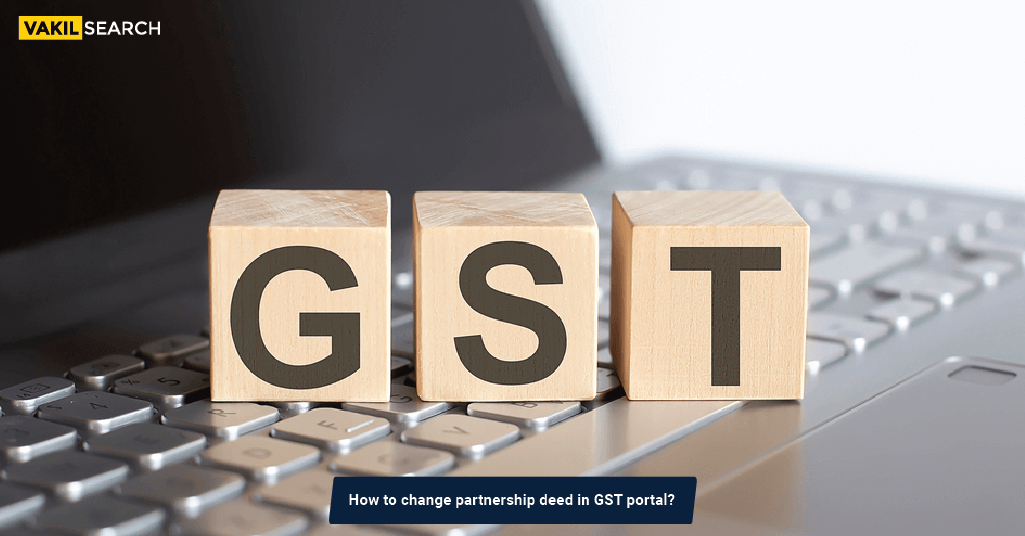Partnership deeds play a crucial role in establishing and governing the relationships and responsibilities among partners in a business. In the context of the Goods and Services Tax (GST), it is essential to ensure that your partnership deed accurately reflects the structure and details of your partnership. This blog post aims to provide a comprehensive guide on changing partnership deeds in the GST portal, offering a step-by-step process along with important considerations during the uploading phase.
Introduction:
Partnerships are a popular business structure that allows individuals to combine their resources, skills, and expertise for mutual benefit. A partnership deed serves as a written agreement that outlines the terms and conditions agreed upon by the partners. In the context of the Goods and Services Tax (GST) in India, it becomes crucial to ensure that the partnership deed reflects accurate information regarding the partnership’s composition, nature of business, and other relevant details. This blog post aims to provide a comprehensive guide on changing partnership deeds in the GST portal, ensuring a seamless transition and compliance with the GST regulations.
Understanding Partnership Deeds:
A partnership deed is a legal document that defines the rights, responsibilities, and obligations of each partner involved in a partnership. It typically includes details such as the partnership’s name, address, the nature of business, capital contributions, profit-sharing ratios, decision-making mechanisms, and other provisions agreed upon by the partners. A partnership deed acts as a foundation for the partnership’s operations and helps establish a clear understanding among the partners.
Why Change the Partnership Deed in the GST Portal?
There are several reasons why you might need to change the partnership deed in the GST portal:
Change in Partnership Structure:
If there have been changes in the partnership structure, such as the admission or retirement of partners, it becomes necessary to update the partnership deed accordingly. The GST portal should reflect the current composition of the partnership.
Change in Business Details:
If there have been modifications to the nature of the partnership’s business activities, address, or any other relevant information, it is essential to reflect those changes accurately in the partnership deed on the GST portal.
Compliance with GST Regulations:
The GST portal serves as a central platform for managing GST-related activities. By updating the partnership deed in the GST portal, you ensure compliance with the GST regulations and maintain accurate records for tax purposes.
Changing Partnership Deeds in the GST Portal:
Step 1: Log in to the GST Portal:
To initiate the process of changing the partnership deed in the GST portal, you need to log in using your registered credentials. Ensure that you have the necessary authorization to make changes on behalf of the partnership.
Step 2: Navigate to the Partnership Deed Tab:
Once logged in, navigate to the relevant section or tab on the GST portal that deals with partnership deeds. The exact location may vary depending on the GST portal’s user interface, so familiarise yourself with the portal’s layout and options.
Step 3: Upload the New Partnership Deed:
Prepare the updated partnership deed in accordance with the prescribed format and guidelines provided by the GST authorities. Make sure to include all necessary information and ensure its accuracy. Convert the partnership deed into a digital format (PDF) and upload it to the GST portal.
Step 4: Submit the Application:
After uploading the new partnership deed, you need to submit an application to change the partnership deed. Fill in the required details accurately and comprehensively, including information about the partnership, partners, and the changes made in the partnership deed. Review all the provided information carefully before submitting the application.
Step 5: Wait for Approval:
Once the application is submitted, it will be processed by the GST authorities. The processing time may vary, and it is essential to regularly check the application’s status on the GST portal. Be patient and allow sufficient time for the authorities to review and approve the changes. If there are any issues or concerns, the authorities may request additional documents or information.
Important Points to Consider While Uploading:
Adherence to Format and Guidelines:
Ensure that the partnership deed follows the prescribed format and guidelines provided by the GST authorities. Any deviations may lead to delays or rejection of the application. Familiarize yourself with the specific requirements for partnership deed updates.
Accuracy of Information:
Double-check all the information provided in the updated partnership deed. Ensure that it accurately reflects the changes made and is consistent with other records and legal documents.
Digital Copies for Reference:
Keep digital copies of all relevant documents, including the old and updated partnership deeds, as well as any supporting documents. These copies will serve as a reference for future use and may be required during audits or other compliance-related activities.
Communication with Partners:
Maintain open communication with all partners involved in the partnership. Inform them about the changes being made to the partnership deed and keep them updated on the progress of the application. Transparency among partners helps avoid misunderstandings and ensures a smooth transition.
Conclusion:
Changing a partnership deed in the GST portal is a crucial step in aligning your partnership’s structure with the requirements of the GST regime. By following the step-by-step process outlined in this guide and considering the important points discussed, you can effectively update your partnership deed, upload it to the GST portal, and await approval. Timely and accurate updates will help maintain compliance, avoid penalties, and facilitate seamless business operations in the GST era. Stay vigilant, stay informed, and keep your partnership records up to date on the GST portal.


